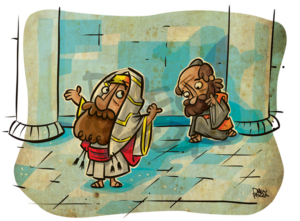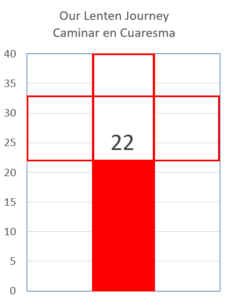

Our Lenten Journey / Caminar en Cuaresma
versión en español
Saturday – March 18 – Day 22
Being Justified by Mercy
Jesus addressed this parable to those who were convinced of their own righteousness and despised everyone else. “Two people went up to the temple area to pray; one was a Pharisee and the other was a tax collector. the tax collector stood off at a distance and would not even raise his eyes to heaven but beat his breast and prayed, ‘O God, be merciful to me a sinner.’ I tell you, the latter went home justified, not the former; for everyone who exalts himself will be humbled,and the one who humbles himself will be exalted.” Luke 18:9–10, 13-14
This Scripture passage introduces the Parable of the Pharisee and the Tax Collector. They both go to the Temple to pray, but their prayers are very different from each other. The prayer of the Pharisee is very dishonest, whereas the prayer of the tax collector is exceptionally sincere and honest. Jesus concludes by saying that the tax collector went home justified but not the Pharisee. He states, “…for everyone who exalts himself will be humbled, and the one who humbles himself will be exalted.”
True humility is simply being honest. Too often in life we are not honest with ourselves and, therefore, are not honest with God. Thus, for our prayer to be true prayer, it must be honest and humble. And the humble truth for all of our lives is best expressed by the prayer of the tax collector who prayed, “O God, be merciful to me a sinner.”
How easy is it for you to admit your sin? When we understand the mercy of God, this humility is much easier. God is not a God of harshness but is a God of the utmost mercy. When we understand that God’s deepest desire is to forgive us and to reconcile us to Himself, then we will deeply desire honest humility before Him.
Lent is an important time for us to deeply examine our conscience and make new resolutions for the future. Doing so will bring new freedom and grace into our lives. So do not be afraid to honestly examine your conscience so as to see your sin clearly in the way God sees it. Doing so will put you in a position to pray this prayer of the tax collector: “O God, be merciful to me a sinner.”
Reflect, today, upon your sin. What do you struggle with the most right now? Are there sins from your past that you have never confessed? Are there ongoing sins that you justify, ignore and are afraid to face? Take courage and know that honest humility is the road to freedom and the only way to experience justification before God.
Let Us Pray:
My merciful Lord, I thank You for loving me with a perfect love. I thank You for Your incredible depth of mercy. Help me to see all of my sin and to turn to You with honesty and humility so that I can be freed of these burdens and become justified in Your sight.
Source: mycatholic.life
USCCB Daily Readings: bible.usccb.org/bible/readings/031823.cfm
Sábado – 18 de marzo – Día 22
Siendo justificado por la misericordia
Jesús dirigió esta parábola a aquellos que estaban convencidos de su propia justicia y despreciaban a todos los demás. “Dos personas subieron al área del templo a orar; uno era fariseo y el otro recaudador de impuestos. el recaudador de impuestos se paró a distancia y ni siquiera alzó los ojos al cielo, sino que se golpeaba el pecho y oraba: “Oh Dios, ten misericordia de mí, pecador”. porque todo el que se enaltece será humillado, y el que se humilla será enaltecido.” Lucas 18:9–10, 13-14
Este pasaje de las Escrituras introduce la parábola del fariseo y el recaudador de impuestos. Ambos van al Templo a orar, pero sus oraciones son muy diferentes entre sí. La oración del fariseo es muy deshonesta, mientras que la oración del recaudador de impuestos es excepcionalmente sincera y honesta. Jesús concluye diciendo que el recaudador de impuestos se fue a su casa justificado pero no el fariseo. Él declara: “…porque todo el que se enaltece será humillado, y el que se humilla será enaltecido”.
La verdadera humildad es simplemente ser honesto. Con demasiada frecuencia en la vida no somos honestos con nosotros mismos y, por lo tanto, no somos honestos con Dios. Así, para que nuestra oración sea verdadera oración, debe ser honesta y humilde. Y la humilde verdad para todas nuestras vidas se expresa mejor en la oración del recaudador de impuestos que oró: “Oh Dios, ten misericordia de mí, pecador”.
¿Qué tan fácil es para ti admitir tu pecado? Cuando entendemos la misericordia de Dios, esta humildad es mucho más fácil. Dios no es un Dios de dureza sino un Dios de suma misericordia. Cuando entendamos que el deseo más profundo de Dios es perdonarnos y reconciliarnos con Él, entonces desearemos profundamente la humildad honesta ante Él.
La Cuaresma es un momento importante para que examinemos profundamente nuestra conciencia y hagamos nuevas resoluciones para el futuro. Hacerlo traerá nueva libertad y gracia a nuestras vidas. Así que no temas examinar honestamente tu conciencia para ver claramente tu pecado en la forma en que Dios lo ve. Si lo hace, estará en condiciones de rezar esta oración del recaudador de impuestos: “Oh Dios, ten misericordia de mí, pecador”.
Reflexiona, hoy, sobre tu pecado. ¿Con qué luchas más en este momento? ¿Hay pecados de tu pasado que nunca has confesado? ¿Hay pecados continuos que justificas, ignoras y temes enfrentar? Anímense y sepan que la humildad honesta es el camino a la libertad y la única manera de experimentar la justificación ante Dios.
Oremos:
Mi Señor misericordioso, te agradezco por amarme con un amor perfecto. Te agradezco por Tu increíble profundidad de misericordia. Ayúdame a ver todo mi pecado y volverme a Ti con honestidad y humildad para que pueda ser libre de estas cargas y ser justificado ante Tus ojos.
Lecturas de Hoy: bible.usccb.org/es/bible/lecturas/031823.cfm